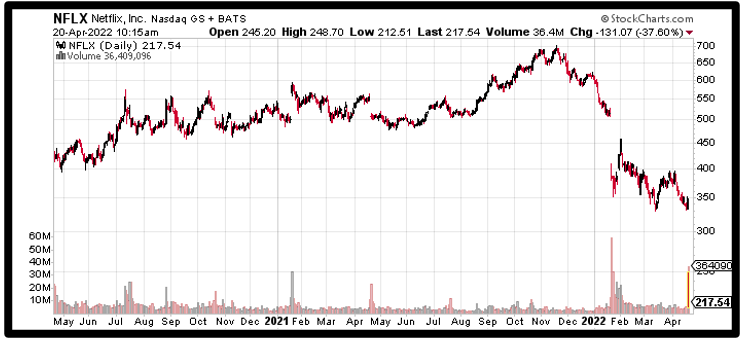Action ... set ... cut!
That's what investors yelled to Netflix (NFLX) after a big subscriber miss yesterday, which was impacted heavily by closed Russian operations.
The best bull markets ignore almost all news events. Traders don't care about unique disruptions like pandemics or wars. Macroeconomics get a blind eye, too.
But not in this case as the streaming media giant's shares slumped 25% in after-hours trading yesterday when executives noted that global subscriptions fell for the first time in a decade. Closed Russian operations factored heavily in the shortfall.
Although the subscriber miss was substantial, the reaction is major trouble for businesses with big Russian exposure.
In fairness, subscriber misses have been common at Netflix.
While the Los Gatos, California-based company has been a terrific business overall, its financial reporting history is littered with washouts following missed quarters. Part of this is the nature of the business.
Executives at Netflix are long-term planners.
CEO Reed Hastings transformed the company in 2009 from a mail order, DVD rental outfit to the world's first streaming network.
Today, the company has 222 million paying subscribers, a remarkable accomplishment in just 13 years.
Related Post: A New Kind of Robinhood
Getting there involved patience and ignoring a lot of the short-term pain that came from operational choices, like price increases and huge investments in content creation.
Like so many Western corporations, Hastings made the snap decision in March to suspend operations in Russia following the Ukraine invasion.
The Yale School of Management reported this week that 750 corporations have left, or are planning to close Russia franchises this year.
The impacts of that could be felt at Netflix, with its financial performance last quarter clearly impaired.
Hastings noted the company lost 200,000 paying subscribers in the first quarter ending March 31. Earlier in March, Netflix suspended all streaming operations in Russia, forfeiting about 700,000 Russian accounts.
Unfortunately for shareholders, traders are not treating the Russian choice as an extraordinary event. Shares lost $90 in after-hours trade on Tuesday, sending shares very near their pandemic lows at $260. Shares are down around a whopping 50% since November 2021.
Why Now Looks Different
It doesn't always work that way. In good stock markets, traders ignore bad news.
During the latter part of 2020, investors turned a blind eye to the pandemic and all the ensuing macroeconomic fallout. They looked past shuttered storefronts and rampant unemployment.
And when executives at public companies refused to give forward guidance, that didn't matter either. Stocks rallied. Investors concluded that the news was extraordinary and could not get worse.
Cumulative earnings for the benchmark S&P 500 index peaked in December 2019 at $139.55, with index trading at 3,230.
As the pandemic raged in 2020, earnings sunk during the next three quarters by 15.4%, 32.2% and 8.2%, respectively. Despite this, the benchmark pushed higher to 3,756.
The woes at Netflix may very well be a special situation … and for a few good reasons.
The business faces increased competition from other media streamers like Walt Disney (DIS), Amazon.com's (AMZN) Prime Video and Alphabet's (GOOGL) YouTube.
These platforms use a blend of paid subscriptions and advertising-based video on demand to give consumers content at reduced prices. Traders may simply be reacting to Netflix being unprepared in that marketplace.
Related Post: The World's Best Company Is in Plain Sight
Then again, maybe traders are going into the second-quarter financial reporting season with their eyes wide open.
Perhaps Netflix is an example of what's to come in the industry. Maybe traders won't look past sales and earnings shortfalls tied to Russia. If that proves true, some firms are in big trouble.
Russian Ripple Effect
There's plenty of huge companies with a ton of Russian exposure.
McDonalds (MCD) has 850 stores in Russia and they have all been closed since March. PepsiCo (PEP), Starbucks (SBUX) and Yum! Brands (YUM), the parent of KFC and Pizza Hut, also have extensive shuttered Russian operations.
And the cigarette maker Philip Morris International (PM) derived 8% of its 2021 sales from Russia, according to a note in Barron's.
Inflation is being impacted heavily by all these geopolitical forces. In fact, it's at an historic level.
My colleague Sean Brodrick is an inflation expert, and he's just released a hard-hitting report to help protect and grow your wealth in these historic times. For more info, check this out.
EPAM Systems (EPAM), a software development company, has even more exposure. The company was founded by Arkadiy Dobkin, a Belarus emigre.
The company maintains most of its operations in Eastern Europe. Half of its 60,000 employees are in Ukraine, Russia and Belarus. Business can't be great.
It's still too early to tell if the reaction to the results at Netflix is about competition or Russia.
All the same, investors should be alert. There is a chance another shoe in the Russia saga is about to drop.
Best Wishes,
Jon D. Markman


